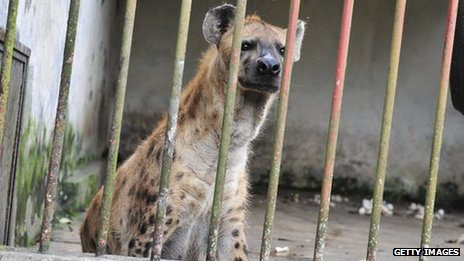BBC
October 18, 2013

Somalia has one of the highest rates of mental illness in the world and with a healthcare system devastated by years of war, most sufferers receive no medical help. Many are chained up – to trees or at home. Some are even locked in cages with hyenas. But one man is trying to change all that.
Dr Hab’s advert runs up to three times a day on Mogadishu’s radio stations.
“He’s gone crazy! He’s running away!” screams the actor. “Chain him down!”
The scenario is familiar in Somalia. A man has become possessed by spirits and the only option for his family is to restrain him and call the sheikh. But as the young man protests, a voice that challenges Somali tradition booms out.
“Stop with the chains!” the voiceover orders. “Take him to Dr Hab’s hospital! If he’s having mental problems, take him to Dr Hab. He won’t chain him, he’ll help him.”
Dr Hab is not actually a real psychiatrist. Rather it’s the persona of Abdirahman Ali Awale, a nurse who after three months of specialist training from the World Health Organization (WHO), has made it his mission to rescue Somalia’s mentally ill. He claims he is able to treat everything from post-natal depression to schizophrenia.
But the alternative to a trip to Hab could be a visit to one of Somalia’s popular herbalists or sheikhs who still advocate traditional – and sometimes barbaric – cures.
“There is a belief in my country that hyenas can see everything including the evil spirits people think cause mental illness,” says Hab. “So in Mogadishu, you will find hyenas that have been brought from the bush and families will pay £350 ($560) to have their loved one locked in the room overnight with the animal.”
The expensive treatment – more than the average annual wage – is as brutal as it sounds. By clawing and biting at the patient, the hyena is thought to force the evil spirit out. Patients, including young children, have been known to die during the process.
“We are trying to show people that this is nonsense,” says Hab. “People listen to our radio advert and they learn that mental illness is just like any other and needs to be treated with scientific methods.”
Hab’s campaign was prompted by an incident in 2005 when he witnessed a group of female patients being chased through the streets by youths. “There was no-one to help them,” he says. “I decided after that I would have to open Somalia’s first mental hospital.”
The Habeb Public Mental Health Hospital in Mogadishu became the first of Hab’s six centres across Somalia. Together, they have now treated over 15,000 patients.
 Daily Stormer The Most Censored Publication in History
Daily Stormer The Most Censored Publication in History


